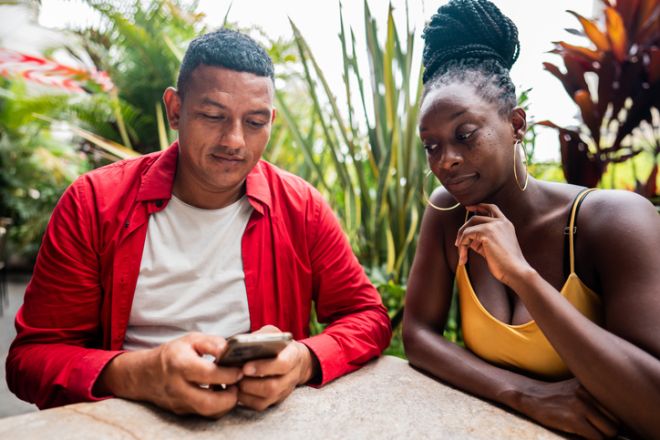What To Say When You Want Someone To Stop 'Phubbing'
Are Your Friends ‘Phubbing’ You? Here’s How To Handle The Rude Habit Killing Relationships
Share the post
Share this link via
Or copy link

Smartphones and tablets have a way of instantly derailing meaningful conversations—or even a juicy gossip session with your bestie—the moment someone picks up their device. Just like that, attention shifts away from the person in front of you. The issue has become so common that communication experts have coined a term for it: phubbing. According to Time writer Angela Haupt, “phubbing,” short for “phone snubbing,” refers to ignoring someone in favor of your phone.
But there’s a deeper issue festering underneath this bad habit.
Chances are, you’re not the only one guilty of it. In group settings—like dinner with friends or family—it often takes just one person picking up their phone for others to follow suit, quickly diving into endless scrolling. According to Nir and Far, psychologists describe phubbing as a form of social contagion, the spread of behaviors, emotions, or habits through a group. It’s similar to trying to eat healthy while your family devours frosted donuts—you’re fighting an uphill battle, the outlet explained. Changing your tech habits becomes just as difficult when everyone around you is glued to their screens. After all, who hasn’t seen a friend suddenly break eye contact mid-sentence to check their phone?
Most of us have come to accept these small but constant interruptions as a normal part of modern life. However, it can be incredibly frustrating when you’re trying to share something important or simply want to be present and enjoy meaningful time with a loved one—free from distractions. So, how do you politely tell someone to get off their phone or tablet?
Respect is the key

Love MadameNoire? Get more! Join the MadameNoire Newsletter
We care about your data. See our privacy policy.
It’s important to be respectful with your request, but don’t be afraid to get a bit creative, too. If you’re out with a group of friends, try asking your pals to place their phones in their bags for the night, or, somewhere out of sight so that you have each other’s undivided attention.
You can say something like, “I’ve got a group chat that’s blowing up right now, but I’d rather talk to you without getting distracted. Can we put our phones away in our bags?”
Jean Twenge, a professor of psychology at San Diego State University, told Haupt that she once heard about a group of girl pals that pushed their phones to the center of the table during dinner to prevent phubbing. The first person to reach for their device had to pay for the entire meal.
While this approach is intended to be lighthearted, the request might feel uncomfortable for some. In that case, taking a more direct approach is totally okay. As Twenge suggested, you could say something like, “Hey, I know we’ve all got things happening on our phones, but I really want to talk to you right now.” This offers a polite and respectful way to ask for your friends’ full attention, without making them feel like they’re being scolded or called out.
RELATED CONTENT: Psychiatrist Reveals How To Quickly Stop A Scary Panic Attack
Consider why they are phubbing

Here are a few more thoughtful ways to encourage your loved ones to put their phones down. In a 2019 article, Screenagers writer Delaney Ruston suggested that it’s respectful—and often helpful—to first consider why someone might be reaching for their phone during a conversation. Are they dealing with something urgent? Is it an emergency, or are they simply distracted? The best way to find out is to ask.
You could say something like, “You seem really busy—should we find another time to hang out when you’re less distracted?”
That simple question can prompt the other person to recognize their behavior and often results in them apologizing and putting their phone away.
Another example is, “It would be great to have your attention. I know many others want it right now too. What are your thoughts?”
This question gives them the chance to explain why their attention is diverted.
Another gentle prompt is, “Is everything OK?”
This approach leaves room for the possibility of an emergency, while subtly signaling that their attention has shifted. It might feel slightly confrontational, Twenge noted, but it’s far more constructive than snapping at someone to “get off their phone.”
It’s respectful, but also signals that you’re in need of their attention and that you want them to put their device away.
Will you be trying some of these helpful techniques the next time you spot someone phubbing?
RELATED CONTENT: 6 Toxic Communication Habits You Need To Break Today
-

My Husband And I Attempted To Have A Creative Date Night At Home -Without A Babysitter - Here's How It Went
-

She Tried It: Ivy Park Drip 2 and 2.2 Black Pack
-

Vontélle Eyewear Founders Score History-Making Licensing Deal With Paramount
-

Our Health, Our Power: Debunking Myths And Taking Charge This Open Enrollment



